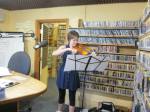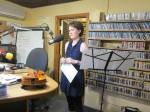Tuning Into Science

Most people get weak in the knees when they think about public speaking; sometimes the anxiety leads to cold sweat and an extraordinarily upset stomach. I am no exception. You would think that by now, being a violinist and ballroom dancer, that performances would be second nature. Walking into a recital? Shouldn’t it be so easy to logically think your way out of the situation? I’ve tried everything, from hours upon hours of practice, to getting angry at myself and saying how it won’t do to worry about it, to meditation… ohmmm. And then… boom there goes an entire half of a memorized Mozart Concerto, as if it were never there. And in that moment, what’s left but to fake smile comically as if it never happened?
But really, performance anxiety is something that doesn’t exactly go away, ever. My father, a trombonist, STILL experiences it at the age of fifty. So where now?
Acceptance. You just have to realize that crap will happen, not everything will go as planned, and you will feel this way. Just accept the feeling as being legitimate and work with it. Our biggest fallacy as people is to push away all negative feelings as if they don’t exist, but let’s be honest, life isn’t coffee and chocolate cake, and anxiety is just as real as happiness. When the adrenaline starts pumping, all of that energy can be channeled into something positive… like the violin or an extremely passionate speech. Do not make the mistake of lying. Oh, you’re not nervous? Well now that you’ve said it, you may as well just stake a claim to the nearest bathroom stall because that is where you will be thinking about it for the next hour.
But don’t take my word for it. After all, I am still in the process of perfecting my speeches myself. It’s taken me years of performance and generalized anxiety just to understand some rudimentary details like how to avoid eating something greasy or worse, Panda Express, before going in for an interview or audition. Do not ask me about how to slow down my talking and breathing, which in my case is usually a hyperventilation episode. But don’t wait, either. Everyone is different, and it is best to start experimenting with the anxiety sooner rather than later. This is something that as scientists, we need to start working on now, and perfect, until maybe we do get to that point of retirement, with so much accumulated respect, that we can say whatever we want.
Why do I bring this up now? Recently, I had the honor of going on a weekly program called the Thesis, run by Tucson’s own local radio, KXCI. Undergraduate researchers, specifically those involved with the Undergraduate Biology Research Program (UBRP) go on to talk about their research, and are asked to bring in two recordings of music that most influenced them as scientists. Seeing an opportunity, I offered to play the violin instead. This was like a double whammy: I got to get my name out there as a musician and scientist, and I got to experience double nerve trouble (DNT, it is now a thing)!
Of course, this wasn’t something I was banking on doing, even a month ago. Opportunities such as this often arise out of the blue. As scientists, we have to be prepared at any given moment to explain what we do to the lay person. As the head of UBRP would say, we owe it to them. We are their tax money at work. That is why it is so important to be able to pull out an elevator speech, no jargon attached, to explain the information that you so well know. Do NOT assume that they will immediately know what you are talking about. On KXCI I made the mistake of saying that microbes ‘protect’ the Great Barrier Reef, and had to respond to the interviewers confused expression- how?? I wish that I could say that I cooly responded with our exact hypothesis, but I ended up stumbling all over the buzzwords: acquisition, uptake, transformation… Be prepared for sidetracks and roadblocks. Something else that I am starting to realize: prepare for questions and do not stick to a single script. Get a feel for what people think is the most interesting or cool, and know how to respond to that with excitement. When I mentioned that I am working with Great Barrier Reef data to my interviewer, of course she had to ask whether I got to go. That is a general trend that I see in people, and am now prepared for. And unfortunately no, I do not, but maybe someday!
And in the end, I played the violin, dedicating it to our awesome former lab technician, RJ, and my younger brother, Ben, who had kindly arranged it for me. The interview was of course, nearly 100% professional, but keep in mind that your persona doesn’t always have to be this way. I personally enjoy hearing people bring something of their own to the table, and it is always nice to acknowledge fellow lab members, mentors, and especially family members. I call it the ‘awwwww’ factor.
Wrapping it up, did my experience go as planned? Of course not!! 🙂 I didn’t glance at my carefully crafted script once. I messed up TONS of chords. Did anybody notice? Well, only my family members 😉 Point is, though, I managed to work around it. I viewed it as an accomplishment, and the first step in growing as a scientist. There is much more to come, and I have only just started. I am grateful for having been given this unique opportunity and look forward to more in the future.
And for all the rest of you budding scientists, best of luck! Be sure to smile, and enjoy every second of chest ripping, blood pumping, adrenaline filled glory.
Here’s the official recording: https://ubrp.arizona.edu/the-thesis-sarah-vining/
This gallery contains 3 photos



